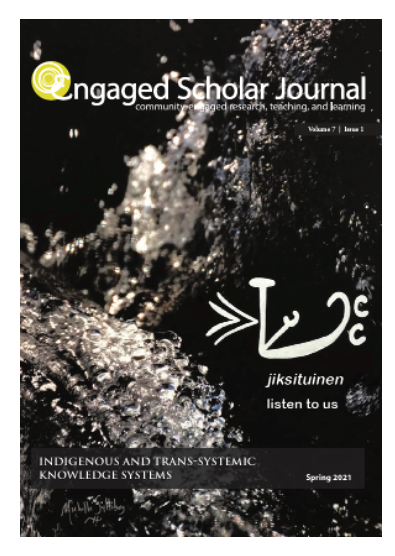Indigenous and Trans-Systemic Knowledge Systems (ᐃᐣdᐃgᐁᓅᐢ ᐠᓄᐤᐪᐁdgᐁ ᐊᐣd ᐟᕒᐊᐣᐢᐢᐩᐢᑌᒥᐨ ᐠᓄᐤᐪᐁdgᐁ ᐢᐩᐢᑌᒼᐢ)
DOI:
https://doi.org/10.15402/esj.v7i1.70768Keywords:
Indigenous Knowledge, Trans-systemic Knowledge Systems, Eurocentric knowledge systemsAbstract
This special issue addressing the theme of “Indigenous and Trans-Systemic Knowledge Systems” seeks to expand the existing methods, approaches, and conceptual understandings of Indigenous Knowledges to create new awareness, new explorations, and new inspirations across other knowledge systems. Typically, these have arisen and have been published through the western disciplinary traditions in interaction and engagement with diverse Indigenous Knowledge systems. Written by Indigenous and non-Indigenous scholars, and in collaborations, the contributions to this issue feature the research, study, or active exploration of applied methods or approaches from and with Indigenous Knowledge systems as scholarly inquiry, as well as practical communally-activated knowledge. These engagements between Eurocentric and Indigenous Knowledges have generated unique advancements dealing with dynamic systems that are constantly being animated and reformulated in various fields of life and experiences. While these varied applications abound, the essays in this issue explore the theme largely through scholarly research or applied pedagogies within conventional schools and universities. The engagement of these distinct knowledge systems has also generated reflective, immersive, and transactional explorations of how to foster well-being and recovery from colonialism in Indigenous community contexts.
References
Bartlett, C., Marshall, M., & Marshall, A. (2012). Two-Eyed Seeing and other lessons learned within a co-learning journey of bringing together Indigenous and mainstream knowledges and ways of knowing. Journal of Environmental Studies and Sciences, 2(4), 331–340. https://doi.org/10.1007/s13412-012-0086-8
Battiste, M. (1984). An historical investigation of the social and cultural consequences of Micmac literacy [Unpublished doctoral dissertation]. Stanford University.
Battiste, M. (1986). Micmac literacy and cognitive assimilation. In J. Barman, Y. Hébert, & D.
McCaskill (Eds.), Indian education in Canada: The legacy (pp. 23-44). UBC Press.
Borrows, J. (2005). Creating an Indigenous legal community. McGill Law Journal/Revue de Droit de McGill 50, 153.
Cajete, G. (1986). Science: A Native American perspective: A culturally based science education
curriculum [Unpublished doctoral dissertation]. International College.
Davidson, S.F., & Davidson, R. (2018). Potlatch as pedagogy: Learning through ceremony. Portage and Main Press.
Donald, D. (2012). Indigenous métissage: A decolonizing research sensibility. International Journal for Qualitative Studies in Education, 25 (5), 335-355.
Du Bois, W.E.B. (1903). The souls of Black folk. A.C. McClurg & Co.
Eastman, C. [Ohiyesa] (2010). Living in two worlds: The American Indian experience (M. Oren Fitzgerald, Ed.). World Wisdom.
Emerich, Y. (2017). Concepts and words: A transsystemic approach to the study of law between law and language. Revue juridique Thémis de l’Université de Montréal 51(2&3), 591-624.
Government of Canada. (2018). Tri-Council Policy Statement: Ethical Conduct for Research Involving Humans. https://ethics.gc.ca/eng/policy-politique_tcps2-eptc2_2018.html
Indigenous Languages Act, S.C. 2019, c. 23.
Janda, R. (2005). Toward cosmopolitan law. McGill Law Journal/Revue de Droit de McGill 50 (4), 967-984.
Kawagley, A.O. (1995). A Yupiaq worldview: A pathway to ecology and spirit. Waveland Press.
Kasirer, N. (2019). Legal education as métissage. Tulane Law Review. 78(2), 481-501.
Little Bear, L. (2000). Jagged worldviews colliding. In M. Battiste (Ed.), Reclaiming Indigenous voice and vision (pp. 77-83). University of British Columbia.
Macdonald, R.A., & MacLean, J. (2005). No toilets in park. McGill Law Journal, 50(4), 721-787.
Nicholson, A., Spiller, C., & Pio, E. (2019). Ambicultural governance: Harmonizing Indigenous and western approaches. Journal of Management Inquiry, 28(1), 31–47.
https://doi.org/10.1177/1056492617707052
Smith, G. H. (1997). Kaupapa Maori theory and praxis [Unpublished doctoral dissertation]. University of Auckland.
Smith, L. T. (1999/2013). Decolonizing methodologies: Research and Indigenous Peoples. Zed Books.
Styres, S. (2017). Pathways for remembering and recognizing Indigenous thought in education: Philosophies of Iethi’nihsténha Ohwentsia’kékha (Land). University of Toronto Press.
Sylliboy, M. (2019). Kiskajeyi - I AM READY: A hermeneutic exploration of Mi’kmaq komqwejwi’kasikl.Rebel Mountain Press.
Truth and Reconciliation Commission of Canada. (2015). Calls to action. https://archives.nctr.ca/NCTR-EDU-003-001-004
UN General Assembly. (2007). United Nations Declaration on the Rights of Indigenous Peoples.https://www.refworld.org/docid/471355a82.html
Wilson, S. (2008). Research is ceremony: Indigenous research methods. Fernwood.
Wilson, S., Breen, A.V., & DuPré, L. (Eds.) (2019). Unsettling ways of knowing through Indigenous relationships. Canadian Scholars.
Published
How to Cite
Issue
Section
License
Authors who publish with this journal agree to the following terms:
- Authors retain copyright and grant the journal right of first publication with the work simultaneously licensed under a Creative Commons Attribution License CC BY 4.0 that allows others to share the work with an acknowledgement of the work's authorship and initial publication in this journal.
- Authors are able to enter separate, additional contractual agreements for the non-exclusive distribution of the journal's published version of the work (e.g., post it to an institutional repository or publish it in a book), with an acknowledgement of its initial publication in this journal.
- Authors are permitted to post their work online (e.g., in an institutional repository or on their website) after the publication of their work in the Engaged Scholar Journal.
- Please note that while every opportunity will be taken to ensure author participation in the editing process, due to time constraints final copyediting changes may be made before publication to ensure APA adherence throughout all submissions.




